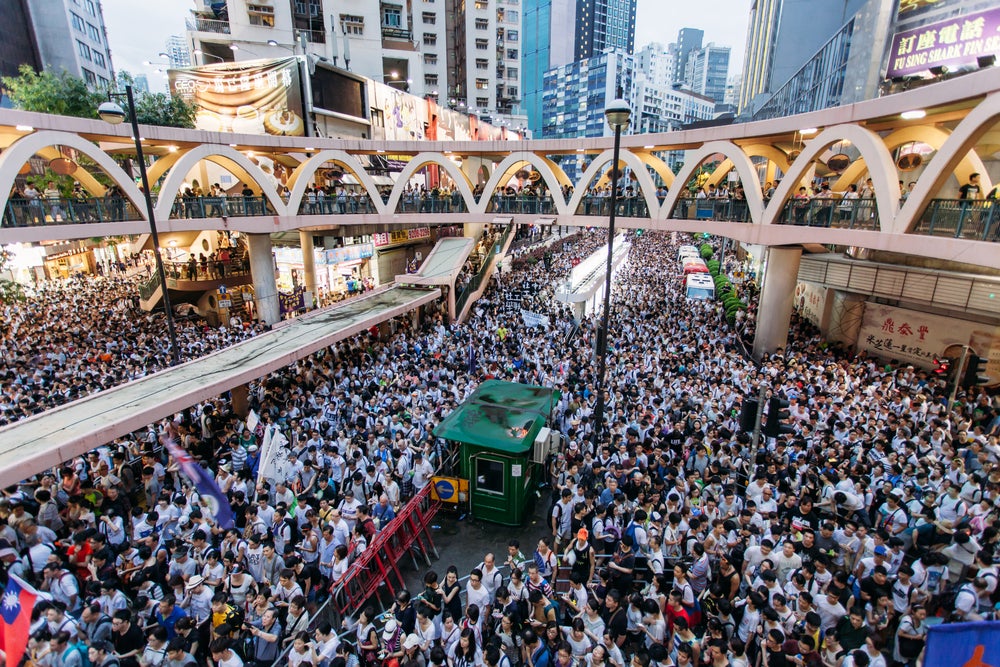
As protests in Hong Kong pass their 20th week, HNWIs in the city are starting to fear that a short-term blip is turning into something much bigger. Oliver Williams looks at how HNWIs are reacting.
Hong Kong “experienced the steepest declines in HNWI wealth (13%) and population (10%) in 2018 across the globe”, said Capgemini’s World Wealth Report in July when protests in the city had barely begun.

Access deeper industry intelligence
Experience unmatched clarity with a single platform that combines unique data, AI, and human expertise.
A “sharp decline in wealth” was how Wealth-X described the state of Hong Kong’s UHNWIs its ‘World Ultra Wealth Report’ published in October, after six months of protests.
Then, later in October came the Credit Suisse Wealth Report, which said Hong Kong had lost 12,000 of its HNWIs in the 12 months to mid-2019.
Many of these reports model the number and fortune of HNWIs from IMF growth forecasts. These were themselves revised in October from previous growth estimates of 2.7% for the year, down to 0.3%. And, to add insult to injury, Hong Kong’s premier, Carrie Lam said the city has just entered a technical recession.
How are HNWIs reacting?
The ‘R’ word is enough to make anybody rush to secure their portfolios against falling markets. But evidence suggests many of Hong Kong’s HNWIs are ahead of Lam in pre-empting a recession.

US Tariffs are shifting - will you react or anticipate?
Don’t let policy changes catch you off guard. Stay proactive with real-time data and expert analysis.
By GlobalDataIn May, when the protests had barely begun, a GlobalData report found HNWIs were rushing to deposits in order to hedge against risk. “Risk-averse retail investors allocate the majority of their wealth to deposits, which accounted for 62.1% of total liquid retail savings and investments in 2018,” said GlobalData’s Hong Kong Wealth Management report.
Trends in retail investors are mirrored in the higher echelons of HNWI wealth bands. According to the UBS Global Family Office Report, Hong Kong’s family offices now hold around 14% of their portfolios in cash, the highest level since 2015.
Driving the move to bonds and cash is the poor performance of equities. Hong Kong’s benchmark Hang Seng index is already the world’s worst performing developed market this year. Many predict it will fall further should protests persist.
 When it comes to illiquid assets property is the favourite investment choice of Hong Kong HNWIs. Property in the city is some of the world’s most expensive: $1m bought you just 22 square meters of prime property last year, according to the Knight Frank Wealth Report.
When it comes to illiquid assets property is the favourite investment choice of Hong Kong HNWIs. Property in the city is some of the world’s most expensive: $1m bought you just 22 square meters of prime property last year, according to the Knight Frank Wealth Report.
However, this also fallen: The value of luxury homes worth more than HK$20m ($2.55m) fell to a five year low in September. The number of transactions also fell 79% since May, according to the Centaline Property Agency.
Transactions in the commercial property fell to record lows as well. Midland IC&I, a property brokerage, recorded just 27 transactions in September, it’s lowest since 1996.
Is money going abroad?
In October, Goldman Sachs reported that outflows from Hong Kong to Singapore were between $3bn and $4bn as of September. However, there are few other metrics supporting the capital flight theory.
While several media reports have suggested that HNWIs are opening bank accounts in Singapore, there is no concrete evidence to suggest that funds are moving from the one city-state to the other. In August, PBI spoke to several Singaporean bank managers who said that, while they saw lots of interest from Hong Kong HNWIs, few had physically relocated their wealth.
Part of the reason might be that HNWIs in Hong Kong already hold a large portion of their assets offshore. GlobalData estimates HNWIs in Hong Kong invested 41% of their total liquid assets outside the country in 2018, much more than the 30% held offshore by Mainland Chinese HNWIs.
Many have taken a leaf out of Li Ka-Shing’s book. Hong Kong’s richest man has steadily been moving his wealth away from his homeland by buying stakes in a number of European companies. In August, he bought Green King, the UK’s largest listed pub and brewery group, for £4.6 billion.
GlobalData’s figures show most mere HNWIs prefer Switzerland, which contradicts media reports of funds flowing to Singapore.

Evidence of HNWIs physically moving abroad is also scant. In August, PBI reported that the Portuguese Consulate General in Macau and Hong Kong had received an increased number of inquiries for its popular citizenship-by-investment program.
However, applicants to either the UK’s Tier 1 visa or other residency visas are unchanged. Hong Kong HNWIs, it seems, are looking to foreign citizenship as an insurance policy, but few are actually moving away from their homeland. Li Ka-Shing, for one, is staying put.
This would imply that HNWIs in Hong Kong are taking a wait-and-see approach to protests. They are nonetheless, watching things very closely, as is Jason McCay, managing partner of Cadence Asia, an Asian asset manager. He advises against investing in big banks and energy companies and creating a flexible portfolio: “We’ve thought carefully about everything we own and can liquidate a position within five days”.







